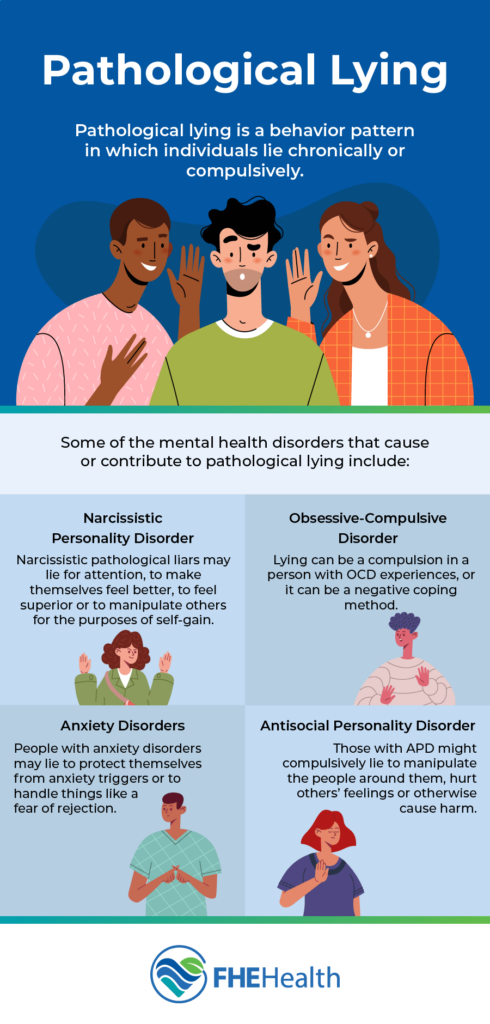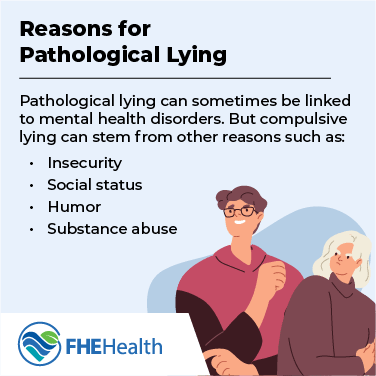
Updated 2/11/26
Everyone lies. It’s a part of life, for better or for worse. Some people find peace in white lies and don’t feel bad about occasionally avoiding the truth to spare a loved one’s feelings. Others, however, see habitual lying, even major lies, as something completely inconsequential. These are what we refer to as pathological liars.
Pathological lying goes far beyond the standard lies most people tell. Pathological liars lie about all kinds of things, big and small, for seemingly no reason whatsoever. Individuals with this personality trait may lie about innocuous things, like weekend plans, or larger topics, like past experiences, work, schooling or relationships. This may seem like nothing more than an obnoxious personality trait — and in some cases, it is — but lying to this level can also be a symptom of a larger problem.
When narcissistic pathological lying begins to interfere with someone’s personal life or the lives of those around them, it may be time to consider a conversation with a therapist or other trained mental health professional.
What is Pathological Lying?
 Pathological lying, sometimes referred to as mythomania or pseudologia fantastica, is a behavior pattern in which individuals lie chronically or compulsively for lying’s sake. To understand the meaning of pathological lying, it’s crucial to recognize that it goes beyond occasional white lies or even habitual dishonesty. In some cases, individuals may lie to make themselves look better, but in others, they may have no good reason to lie or gain nothing from the act of lying. Being the friend or family member of a pathological liar can be very frustrating, as it’s hard to tell what’s a lie and what isn’t or when a liar can be trusted.
Pathological lying, sometimes referred to as mythomania or pseudologia fantastica, is a behavior pattern in which individuals lie chronically or compulsively for lying’s sake. To understand the meaning of pathological lying, it’s crucial to recognize that it goes beyond occasional white lies or even habitual dishonesty. In some cases, individuals may lie to make themselves look better, but in others, they may have no good reason to lie or gain nothing from the act of lying. Being the friend or family member of a pathological liar can be very frustrating, as it’s hard to tell what’s a lie and what isn’t or when a liar can be trusted.
“Sometimes lying can be a coping response, often starting in childhood, for some psychological or personality issue that may not be at first visible, it is important to see past just dealing with the lying to uncover the cause,” shares Dr. Beau A. Nelson, DBH, LCSW, Chief Clinical Officer at FHE Health.
There may be biological drivers behind pathological lying. One study found that central nervous system behavior may influence a propensity for lying, and another found evidence of lying due to an imbalance in the hormone-cortisol ratio. However, due to the differences in the nature of lying and the purposes of lying from one individual to another, there’s not always clear logic behind when or why pathological lying occurs.
Pathological vs. Habitual Lying
It’s important to distinguish between pathological and habitual lying. While both involve frequent untruths, the underlying motivations and psychological implications can differ significantly.
- Pathological Lying: This is often considered a symptom of a deeper psychological issue, like personality disorders or neurological conditions. Pathological liars may not always be aware of their lies or the reasons behind them. Their lying can be compulsive and serve no clear purpose or benefit.
- Habitual Lying: This describes a pattern of frequent lying that has become ingrained as a habit. While habitual liars may lie frequently, their behavior is not necessarily indicative of a mental health disorder. They may lie for various reasons, such as to avoid consequences, gain attention, or manipulate others. The key difference is often the presence of a diagnosable mental health condition in pathological lying.
Pathological vs. Compulsive Lying: Understanding the Nuances
The terms “pathological liar” and “compulsive liar” are often used interchangeably, but there are subtle differences between them. Both types involve persistent and often pointless lying, yet their motivations and levels of awareness differ.
Pathological lying is frequently linked to underlying personality disorders, such as narcissistic or antisocial personality disorder. Individuals who are pathological liars may be less aware of their deceptions and sometimes believe their own fabrications. Their lies can be grandiose and fantastical.
On the other hand, compulsive lying focuses on an irresistible urge to lie. While compulsive liars are generally more aware of their dishonesty, they struggle to control the impulse, often using lying as a coping mechanism for anxiety or insecurity. Their lies tend to be more mundane and frequent compared to those of a pathological liar. The emphasis here is less on a deep-seated disorder and more on the habitual, almost addictive nature of the lying.
Although the distinction can be blurry, the key differences lie in awareness—compulsive liars are generally more aware of their actions—and the underlying causes, since pathological lying often stems from personality disorders. Regardless of the label, chronic lying can damage relationships and overall well-being, making it crucial to seek professional help to address the root causes and break the cycle of deception.
 While pathological lying can be linked to mental health disorders, it isn’t always. There are numerous other reasons people may lie with abandon, including:
While pathological lying can be linked to mental health disorders, it isn’t always. There are numerous other reasons people may lie with abandon, including: It can be challenging, even overwhelming, to maintain a close and trusting relationship with someone prone to pathological lying. The constant uncertainty and broken trust make it difficult to have such a person in your life. If the pathological liar is a close friend,
It can be challenging, even overwhelming, to maintain a close and trusting relationship with someone prone to pathological lying. The constant uncertainty and broken trust make it difficult to have such a person in your life. If the pathological liar is a close friend, 





